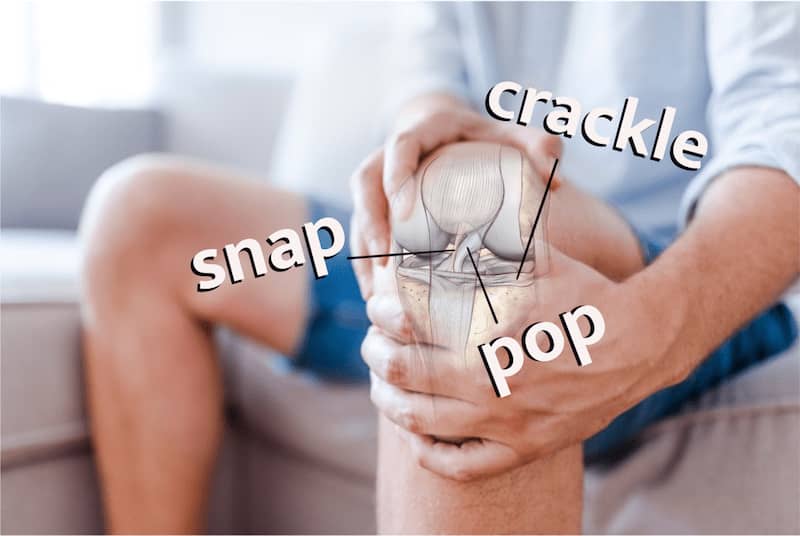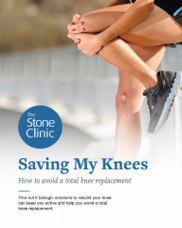What's Happening When Your Knee Goes Snap, Crackle, and Pop
A question I am asked a lot is, “I hear clicking and popping in my knee. Is this something I should be concerned about?”

Knee noise in the form of crackling, clicking, or popping is very common. It may be caused by simple soft tissue catching or by more serious damage to the bearing surface of the joint: the articular cartilage. I tell my patients that unless it is causing pain and/or swelling, or the knee is giving away, it is nothing to worry about. If either or both are true, I’ll investigate further. Clicks and pops are OK unless they cause pain, swelling, or instability.
No worries: Painless clicks & pops
Sometimes the noise is due to tiny air bubbles inside the joint fluid, which build up with changes in joint pressure. The bubbles make a noise when they burst. This is called cavitation. Another cause for painless popping in the knee is when the ligaments and tendons catch as they go over a bony lump within the knee —or over scar tissue—and pop when they snap back into place. Most of the time these noises are natural and do not mean that you will develop arthritis or be prone to injury. Knee clicking and popping are extremely common during the first year after any knee surgery. These are usually due to soft tissue swelling or early scar formation. Soft tissue massage is the trick to resolving the naturally healing tissue’s excess thickness.
Some concern: Persistent popping with swelling, pain, catching, or grinding
When the knee popping sounds are accompanied by swelling and pain, or produce a catching sensation, or the knee gives way, I worry about a possible injury within the knee. A physician should examine the knee to help make a clear diagnosis.
In this case, there are several possible explanations for the popping. The noise and pain may be a mechanical symptom, which feels like something is caught in the knee as it moves back and forth. This kind of popping is often a sign that you have a meniscus tear, or that a small piece of loose cartilage is caught in the knee. You would most likely feel this kind of popping pain come and go. An exam, X-ray, and MRI will tell the definitive story.
Painful knee popping can also be caused by osteoarthritis, where the smooth cartilage has worn down and the bones cause friction when they rub against one another. This painful popping would be more persistent.
Another common problem that results in a popping or grinding sensation is roughness on the undersurface of the patella. This used to be called chondromalacia, and is often labeled as patellofemoral pain syndrome, or “runner’s knee.” Often you may feel the popping, grinding, or crunching more than you can hear it. To feel this, try squatting with your hand flat over the front of your knee.
For each of these types of knee sounds, if there is no tissue torn, anabolic injections of growth factors plus lubricants (our current knee cocktail is a combination of hyaluronic acid, PRP, and other sources given in one shot) has been surprisingly and often dramatically effective.
Real worry: Loud pop at time of injury followed by swelling, instability, and giving way
When a patient says to me, “Doc, I heard a pop and my knee swelled,” it is definitely a cause for concern. If there is a pop at the time of injury, the knee has almost certainly been damaged. You have most likely injured either your ligaments — anterior cruciate ligament, posterior cruciate ligament or medial collateral ligament — or the meniscus or articular cartilage. The knee will usually swell up after these kinds of injuries.
If there is pain, swelling, or giving way of the knee, we will do a careful exam, history, X-ray, and MRI. By studying the cartilage and soft tissue within the knee, we can determine which tissues need to be repaired. Sometimes careful physical therapy, combined with injections, can fix the problem and help you avoid surgery.
So remember: If you hear clicks and pops in your knee but feel no pain or swelling, don’t worry. It is normal. If you have pain, instability, or swelling, make sure you check it out to avoid further damage to the joint. The philosophy on this has changed from “rest your knee and wait until you are older for a joint replacement” to “fix the problem ASAP by repairing, regenerating, or replacing the missing tissue and cartilage so that you may never develop arthritis or need a knee replacement.”
While it is always best to hear the sounds of silence, snap, crackle, and pop sometimes need to be listened to as well.
If you are experiencing undiagnosed knee pain, you may use our knee pain symptom checker to learn more about your injury.
Article originally published December 15, 2013. Updated & republished August 16, 2020 by Kevin R. Stone, MD with scientific and content updates.


